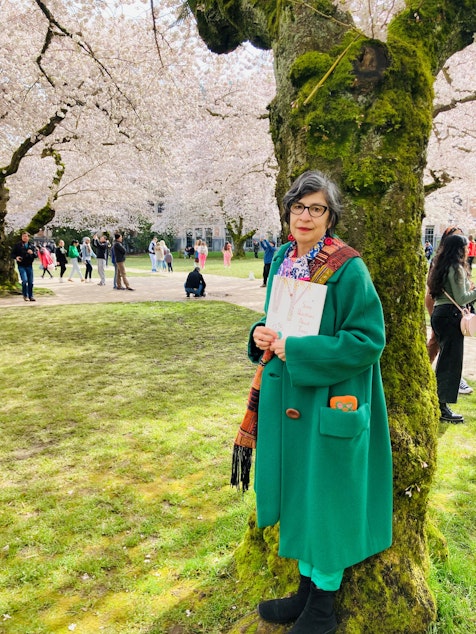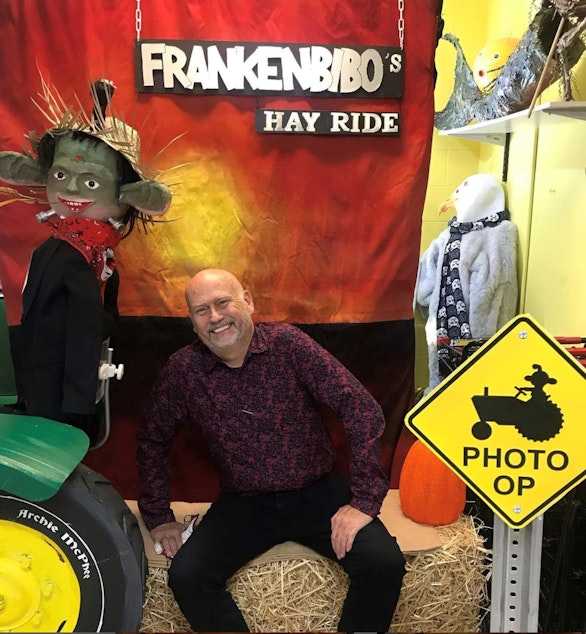Adulting 101: Tap into your inner child

Throughout this pandemic many of us have dipped into nostalgia and tapped into childhood to cope.
Borrowing from the past can be helpful, but it can also be really hard to go back there. That’s where inner child work comes in.
Anxiety, uncertainty and isolation.
It's the unwelcome emotional trio that's made a home in our minds thanks to the pandemic.
One way to work through it: getting in touch with your inner child.
In therapy, this can look like writing letters to your younger self, reading books from childhood or wiggling your toes in the grass.
Canh Tran, a therapist at Liberation Healing Seattle, said these are exactly the kinds of “prescriptions” he brings to clients.
Sponsored
Tran focuses on relationships, inner child work and trauma. Many of his clients have survived abuse and neglect.
“The inner child is a younger part of us, that might have wounds, might have some pain, might even be a little nostalgic,” he said, “parts of ourselves that sometimes we disavowed or that we forgot.”
Focusing on the inner child is a tool to navigate all kinds of approaches to mental health
“It's really about slowing down, practicing acceptance, being really curious and compassionate, and really nurturing our younger self for the things that we didn't receive, needed or even deserved growing up,” Tran said.
But it takes some time for many to warm up to the idea. A lot of people will roll their eyes, Tran said.
Sponsored
Few are willing to hug an invisible version of their younger selves. Through an exercise in “reparenting” Tran will ask his client’s to close their eyes and nurture a younger version of themselves. He’ll ask clients questions that they answer for themselves, so they may offer themselves what they needed or wanted in the past.
What did you want people around you to get, feel and understand about your experience?
In those moments when someone died, left, abandoned or forgot about you, what would have felt good or soothing in that moment?
When you feel sad, rejected or not good enough and shame becomes your friend, what do you want other people to do or think around you?
This work takes time. At the beginning of inner-child therapy, Tran just wants to build trust and set up expectations from therapy, then the childhood homework begins.
Sponsored
The homework is intended to restore childlike abilities to play, hope, imagine and fantasize. The childhood “prescriptions” help heal old wounds, but they may be especially valuable right now.
“As we're living during these tumultuous times, to say the least, having hope, fantasizing, playing desiring, pleasure can be such a great antidote,” he said.
Throughout the pandemic, many have begun to think differently about the work they do, the roles they play in family or friendship, and the places they live.
Tran said this moment of emotional upheaval and pandemic has been transformative. He points specifically to clients that are listening to their needs and wants more often in part due to therapy. Some of them hopped aboard the Great Resignation and quit their jobs. Others are reevaluating their relationships to motherhood. He said his clients are much more capable of speaking up for themselves.
"This little kid realizes, making this amount of money or looking this way, ‘It doesn't make me happy. I want something more out of my life,’” Tran said.
Sponsored

Toni Yuly, a Bremerton author and illustrator, said that tapping into her inner child comes naturally.
“I think kids are so present, they really see the world, just kind of as it is, the wonder of it,” she said. “As an artist, that's just what I tap into all the time.”
Her latest children's book, "Some Questions About Trees," examines the endless stream of questions many kids ask, questions that escalate in scope and depth until eventually, you don't have an answer.
Yuly writes from the point of view of a young child. She asks questions like, “Are trees afraid of the dark?” and “What part is the heart of a tree?”
Sponsored
Yuly said she knows tapping into your inner child is not easy and for many it might be painful. But, she thinks it could do us all some good.
“I think if you can learn to let it in a little bit more,” she said, “life could be a better place.”
Soundside also caught up with Mark Pahlow, the founder of Archie McPhee’s, a gift shop in Seattle's Wallingford neighborhood. Archie McPhee's is dripping with nostalgia.

The store is chock full of all things weird or kooky. From Big Foot ornaments to yodeling pickles, plenty of rubber chickens and "handerpants." Yeah that's underpants for your hands, why do you ask?
Pahlow opened the store following a hobby of his 70s: collecting vintage trinkets and novelty toys at LA auctions and estate sales. Over the years, the location changed, but the weird remained.
Pahlow said the team at Archie McPhee’s is all on the same page. They’re constantly asking themselves, "What can we do that's really weird and then we present it to the world." He said the results are usually well received.
It’s hard not to project a childlike wonder onto a place like Archice McPhee’s and by extension the founder, Pahlow.
Pahlow said he definitely taps into his inner child by having a store with old toys, monsters, sci-fi and all kinds of “little boy things” he could never get away from.
But he’s also a nostalgia trippin' skeptic.
“You can get locked into a world that doesn't exist anymore,” he said.
Pahlow said he sees his store as a way of reminding and remembering who he is and where he came from. He said he can have moments with the rubber chickens and latex possums or xocolatls, but ultimately it's about moving forward with them. Even toward death.
“Well, statistically, I am old now, I am not young,” he explained.
“And in the end, you have to let everything go,” he said, “You have to let your loved ones, your money, your stuff, your rubber chickens, it's all going, baby.”





